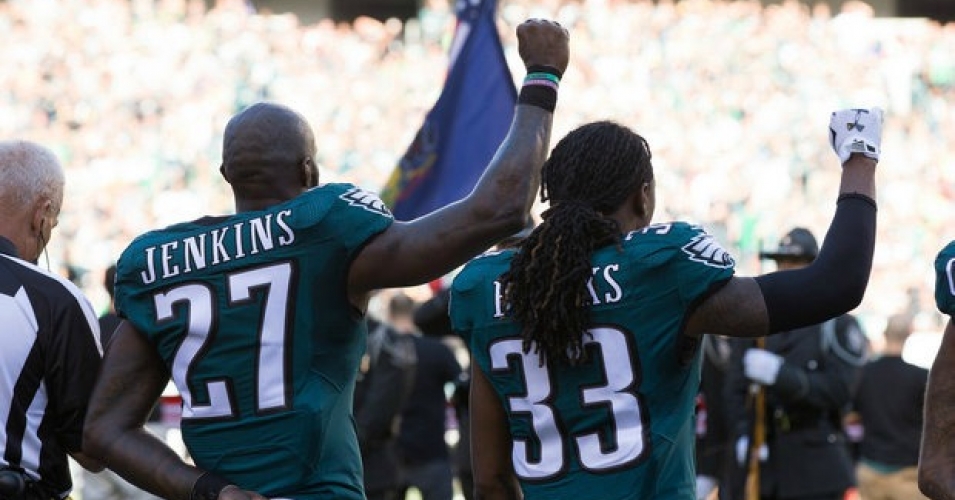Protesting the Injustice, Not the Flag
Members of the Philadelphia Eagles in protest.
October 1, 2017
The intersection between sports, politics, and activism has been long evident. In times of sociopolitical unrest, athletes in a variety of sports have used their platform in order to express messages of protest, create calls for unity, and use their celebrity status to progress campaigns for social justice. We saw this with Muhammad Ali and his public criticism of the government, refusing to enlist in the military, claiming that he would not serve and risk his life for a nation that discriminated people of his race. We saw this with Tommie Smith and John Carlos, two African-American gold and bronze medalists, respectively, who at the 1968 Olympic games upon invitation to the podium to receive their awards, instead stood up and both put one clenched fist in the air during the whole ceremony, a symbol of support and unity for the racial injustice and systemic persecution of black people in the United States. Fast forward nearly fifty years later and we find ourselves witness to the reinvigoration of this intersectionality, this time through a different means: members of the NFL, players and staff alike, kneeling for the playing of the national anthem.
When Colin Kaepernick, former perennial but inconsistent quarterback to the San Francisco 49ers, decided he was not going to stand for the national anthem close to fourteen months ago as a method of protesting consistent racial discrimination and the structures that allow it, he was met with severe backlash. His actions, despite great support from former individuals within the military, were seen as disrespectful to all veterans, a direct jab against “American” ideals, and an overall attack upon the nation’s most sacred symbols: the flag and the national anthem. Thus, he was isolated, chastised, and essentially pushed out of his contract with the team so he would no longer represent an organization that did not value his freedom of expression. The media obliterated his actions. NFL owners spoke out and banded together against him. Even certain players publicly rebuked his actions, and while others kneeled or locked arms alongside Kaepernick, there was not a sufficient amount of support to affect viewership and sponsorship, the only things that would create any change within the hyper-capitalist, conservative organization of the NFL.
Thus, with the recent comments of Donald Trump, calling those utilizing their freedom of speech as “sons of b*tches,” the support and public outcry from owners, coaches, and media proved to be extremely disingenuous—a product of the potential economic consequences from decreasing viewership, lower ratings, and the association between the NFL and the beliefs of our discriminatory, controversial president.
The primary ideological rebuttals against those who kneel for the flag lie upon the premise that it is an attack against the United States and those who have sacrificed their lives for it. However, when Rosa Parks refused to give up her seat during the Civil Rights Movement, she was not protesting the department of transportation, but rather the continuous oppression of her fellow African Americans. Similarly, those kneeling for the anthem are not attacking veterans or the United States through the symbol of the flag, but rather the systems that evoke racial discrimination. By failing to identify the nuance in his protest, people are attaching the racism and the injustices players are kneeling for with the ideals that they state are the foundation of the nation. The United States has become so desensitized to racist persecution that it is now deeply embedded within the norm. Now, any protests against it are considered broader attacks on the country.
In a nation full of historic xenophobic rhetoric, unequal political and social representation, and consistent systematic oppression, the flag and the ideals of freedom that it symbolizes have been exclusive to a certain demographic. Therefore, while the flag may represent all these great ideals for those privileged to benefit from them, others, specifically people of color, view it as a symbol of a network of oppressive structures that create our country.
Ultimately, the United States is a capitalist nation where change only takes place through the loss of monetary compensation. It is hard to navigate and realize who is truly supporting the cause and who is supporting it as a means of maintaining good PR to ensure they don’t lose money. However, after the fiasco with Donald Trump’s comments and the NFL’s call for unity, it is curious that the organization and media that once obliterated Colin Kaepernick now suddenly wants to coordinate a movement for the freedom of speech, and this can be explained by the increasing loss of viewership and ratings within the NFL.
As a society, we must not only coordinate ourselves to recognize and elevate those who utilize their platform to reflect messages of the greater good, but also to especially recognize Colin Kaepernick and the movement that he spearheaded, yet receives little credit for.

























